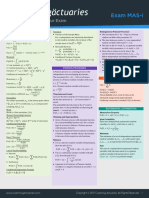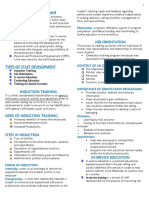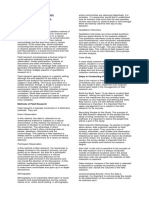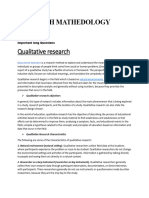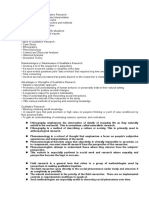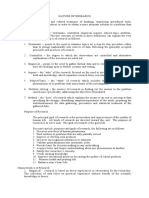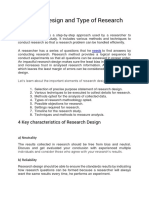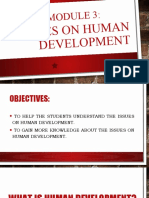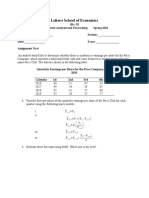Module 1
Uploaded by
Jehan KristellModule 1
Uploaded by
Jehan KristellName: Jehan Kristell R. Lucero ID NO.
202323403
Subject: PYM 106 (Field Methods in Psychology)
MODULE 1
Lesson 1A Assessment:
Answer/accomplish and submit to coordinator@capcollege.com.ph.
1. What are the important methods of Field Research? Identify its distinction
(unique features) from the other methods.
Field research is typically conducted in 5 distinctive methods. They are:
- Direct Observation. In this method, the data is collected via an observational
method or subjects in a natural environment. In this method, the behavior
or outcome of situation is not interfered in any way by the researcher. The
advantage of direct observation is that it offers contextual data on people
management, situations, interactions and the surroundings. This method of
field research is widely used in a public setting or environment but not in a
private environment as it raises an ethical dilemma.
- Participant Observation. In this method of field research, the researcher is
deeply involved in the research process, not just purely as an observer, but
also as a participant. This method too is conducted in a natural environment
but the only difference is the researcher gets involved in the discussions
and can mould the direction of the discussions. In this method, researchers
live in a comfortable environment with the participants of the research
design, to make them comfortable and open up to in-depth discussions.
- Ethnography. Ethnography is an expanded observation of social research
and social perspective and the cultural values of an entire social setting. In
ethnography, entire communities are observed objectively. For example, if
a researcher would like to understand how an Amazon tribe lives their life
and operates, he/she may choose to observe them or live amongst them
and silently observe their day-to-day behavior.
- Qualitative Interviews. Qualitative interviews are close-ended questions that
are asked directly to the research subjects. The qualitative interviews could
be either informal and conversational, semi-structured, standardized and
open-ended or a mix of all the above three. This provides a wealth of data
to the researcher that they can sort through. This also helps collect
relational data. This method of field research can use a mix of one-on-one
interviews, focus groups and text analysis.
- Case Study. A case study research is an in-depth analysis of a person,
situation or event. This method may look difficult to operate, however, it is
one of the simplest ways of conducting research as it involves a deep dive
and thorough understanding the data collection methods and inferring the
data.
2. Enumerate the STEPS relevant to conducting a Field Research. Why is
observation an important step specially in the field of Psychology?
Observation is fundamental to the scientific study of psychology because it
provides essential data for understanding human behavior, generating
hypotheses, and informing clinical practice.
The following are the steps relevant in conducting a Field Research:
1. Build the Right Team/Group in the study: To be able to conduct field research,
having the right team is important.
2. Recruiting People for the Study: The success of the field research depends on
the people that the study is being conducted on.
3. Data Collection Methodology: As spoken in length about above, data collection
methods for field research are varied. They could be a mix of surveys,
interviews, case studies and observation. All these methods have to be chalked
out and the milestones for each method too have to be chalked out at the
outset.
4. Site Visit: A site visit is important to the success of the field research and it is
always conducted outside of traditional locations and in the actual natural
environment of the respondent/s. Hence, planning a site visit along with the
methods of data collection is important.
5. Data Analysis: Analysis of the data that is collected is important to validate the
premise of the field research and decide the outcome of the field research.
6. Communicating Results: Once the data is analyzed, it is important to
communicate the results to the stakeholders of the research so that it could be
actioned upon.
3. Create a matrix showing the ADVANTAGES and DISADVANTAGES of Field
Research.
Advantages of Field Research Disadvantages of Field Research
• It is conducted in a real-world and • The studies are expensive and
natural environment where there is time-consuming and can take years
no tampering of variables and the to complete.
environment is not doctored. • It is very difficult for the researcher
• Due to the study being conducted in to distance themselves from a bias
a comfortable environment, data in the research study.
can be collected even about • The notes have to be exactly what
ancillary topics. the researcher says but the
• The researcher gains a deep nomenclature is very tough to
understanding into the research follow.
subjects due to the proximity to • It is an interpretive method and this
them and hence the research is is subjective and entirely
extensive, thorough and accurate. dependent on the ability of the
researcher.
• In this method, it is impossible to
control external variables and this
constantly alters the nature of the
research.
MODULE 1
Lesson 1B Assessment:
Answer/accomplish and submit to coordinator@capcollege.com.ph.
1. How important are Statistical Testing and Ethical Issues in the study of Field
Methods in Psychology?
Statistical testing and ethical considerations are both crucial aspects of conducting
research in psychology, especially when employing field methods because ignoring
either statistical testing or ethical issues can compromise the validity and integrity of
research findings. Therefore, both are indispensable components of the research
process in field methods within psychology.
2. Distinguish between Reliability and Validity in field research methods.
Reliability is a measure of consistency, if a particular measurement is repeated and
the same result is obtained then it is described as being reliable while Reliability is a
measure of consistency, if a particular measurement is repeated and the same result
is obtained then it is described as being reliable.
3. Construct a phenomenon relevant to your field and identify which variable
is INDEPENDENT and DEPENDENT.
Phenomenon: The effect of the different feedbacks on the performance of the
employees
Independent Variable: Different type of Feedback
• The researcher manipulates this variable by exposing the employees to
the different types of feedback.
Dependent Variable: Employee Performance
• The performance of the employee depends on the type of feedback it
receives, making it the dependent variable in this study.
By systematically varying the different feedback provided to the employee and
measuring its performance, researchers can investigate how different types of
feedback affect the employee’s effectiveness during in their customer service
interactions.
MODULE 1
Lesson 1C Assessment:
Answer/accomplish and submit to coordinator@capcollege.com.ph.
1. Explain how scientific research addresses questions about behavior.
By following this systematic approach, scientific research in psychology generates
knowledge about behavior that is empirically grounded, replicable, and subject to
critical evaluation, advancing our understanding of human and animal behavior.
2. How does scientific research guide public policy? For instance, the global
pandemic COVID-19 impact to mental health.
Scientific research plays a crucial role in guiding public policy, especially in
addressing complex issues such as the impact of global pandemics like COVID-
19 on mental health. Overall, scientific research provides the evidence base
needed to develop, implement, and evaluate public policies aimed at mitigating the
mental health impacts of the COVID-19 pandemic and promoting resilience and
well-being in communities
3. Synthesize on how scientific research can be important in making personal
decisions.
Scientific research serves as a valuable resource for individuals seeking to make
informed decisions in various aspects of their lives, empowering them to enhance
their well-being, achieve their goals, and navigate the complexities of the modern
world more effectively
MODULE 1
Lesson 2 Assessment:
Answer/accomplish and submit to coordinator@capcollege.com.ph.
1. What are your biases and appreciations to research, specifically as a student
and major in Psychology?
Biases:
a. Confirmation Bias: The tendency to search for, interpret, or prioritize
information that confirms preconceptions or hypotheses while ignoring
contradictory evidence.
b. Observer Bias: When the researcher's expectations or beliefs influence
their observations or interpretations of a study's results.
c. Sampling Bias: Occurs when the sample used in a study is not
representative of the population, leading to skewed or inaccurate
conclusions.
d. Social Desirability Bias: Participants may respond in ways that are
perceived favorably by others, rather than providing honest answers,
affecting the validity of the data.
e. Cultural Bias: Research findings may not generalize across different cultural
contexts due to the inherent biases of the researchers or the methods used.
Appreciations:
a. Empirical Rigor: Valuing research that adheres to rigorous methodologies,
including proper experimental design, control of variables, and statistical
analysis.
b. Ethical Considerations: Appreciating research that prioritizes the well-being
and rights of participants, including obtaining informed consent, minimizing
harm, and ensuring confidentiality.
c. Interdisciplinary Perspectives: Recognizing the value of integrating insights
from various disciplines, such as neuroscience, sociology, and
anthropology, to gain a comprehensive understanding of human behavior.
d. Critical Thinking: Emphasizing the importance of evaluating research
findings critically, considering alternative explanations, and recognizing the
limitations of studies.
e. Practical Applications: Appreciating research that has real-world
implications and can inform interventions, policies, or practices to improve
individuals' lives or address societal issues.
2. Explain in your own understanding “Research as a Script” discussed by Dr.
Mira Ofreneo.
According to Dr. Ofreneo: "Research is not merely a process; it's a narrative—a
story we tell through data, analysis, and interpretation.”
Like a script, each study unfolds, revealing new insights and shaping our
understanding of the human condition.
3. You are into embarking research, what lessons can you get from Practical
Feasibility and Ethical Responsibility?
Embarking on research requires careful consideration of both practical feasibility
and ethical responsibility. By integrating lessons from both practical feasibility and
ethical responsibility, researchers can conduct research that is not only feasible
and well-executed but also ethical, responsible, and respectful of participants'
rights and well-being.
4. How is the shift from quantitative to qualitative methods significant to you
as major of Psychology?
As a major in Psychology, the shift from quantitative to qualitative methods holds
significant implications for how I understand and approach research in the field.
The shift from quantitative to qualitative methods in Psychology broadens my
methodological toolkit, deepens my understanding of human behavior, and
enhances my ability to conduct research that is meaningful, relevant, and impactful
in addressing real-world issues and challenges.
5. Create your own concept map of the five (5) Research Processes identified
and thoroughly discussed in the video lecture presentation.
Here's a concept map illustrating the five research processes. Note that each of
these processes is interconnected and essential for conducting rigorous and
impactful research in psychology.
A. Formulating Research Questions
• Identifying research topic
• Reviewing literature
• Narrowing down focus
• Developing research questions
B. Designing Research Methods
• Choosing research approach (quantitative, qualitative, mixed methods)
• Selecting research design (experimental, correlational, descriptive)
• Determining sampling method (random, stratified, convenience)
• Planning data collection techniques (surveys, interviews, observations)
• Establishing variables and measures
C. Collecting Data
• Recruiting participants
• Obtaining informed consent
• Implementing data collection procedures
• Recording observations
• Administering surveys or assessments
D. Analyzing Data
• Organizing and cleaning data
• Conducting statistical analysis (descriptive, inferential)
• Interpreting findings
• Identifying patterns and themes (qualitative)
• Drawing conclusions
E. Interpreting and Reporting Results
• Discussing implications of findings
• Comparing results to existing literature
• Addressing limitations and future directions
• Communicating results through academic papers, presentations, or reports
You might also like
- Research in Child and Adolescent Development100% (4)Research in Child and Adolescent Development43 pages
- Module 1-Practical Research 2-First GradingNo ratings yetModule 1-Practical Research 2-First Grading15 pages
- Sheet 1. Concepts of Research and TypesNo ratings yetSheet 1. Concepts of Research and Types10 pages
- Module 1 - The Nature and Importance of Research in Daily LifeNo ratings yetModule 1 - The Nature and Importance of Research in Daily Life21 pages
- HTTPS://WWW - Scribd.com/presentation/369370548/importance of Qualitative Research Across Different Fields100% (1)HTTPS://WWW - Scribd.com/presentation/369370548/importance of Qualitative Research Across Different Fields2 pages
- Research in Child and Adolescent Part 1No ratings yetResearch in Child and Adolescent Part 122 pages
- Describes Characteristics, Strengths, Weaknesses, and Kinds of Qualitative Research100% (1)Describes Characteristics, Strengths, Weaknesses, and Kinds of Qualitative Research29 pages
- PR1-REVIEWER_3rd-qtr-2024-25 (AutoRecovered)No ratings yetPR1-REVIEWER_3rd-qtr-2024-25 (AutoRecovered)5 pages
- Dept Education 1705 MED II SEM Qualitative ResearchNo ratings yetDept Education 1705 MED II SEM Qualitative Research6 pages
- Research-in-child-and-adolescent-development-1No ratings yetResearch-in-child-and-adolescent-development-129 pages
- Chapter 5 Qualitative Research and MethodologyNo ratings yetChapter 5 Qualitative Research and Methodology9 pages
- Research Design and Type of Research DesignsNo ratings yetResearch Design and Type of Research Designs11 pages
- Non-Experimental-Research 20240913 054512 0000No ratings yetNon-Experimental-Research 20240913 054512 000025 pages
- Research Methods and Methods in Context Revision Notes for AS Level and A Level Sociology, AQA FocusFrom EverandResearch Methods and Methods in Context Revision Notes for AS Level and A Level Sociology, AQA FocusNo ratings yet
- Research Proposal a Simplified Step-by-Step Guide - Revised EditionFrom EverandResearch Proposal a Simplified Step-by-Step Guide - Revised EditionNo ratings yet
- Participatory Action Research for Evidence-driven Community DevelopmentFrom EverandParticipatory Action Research for Evidence-driven Community DevelopmentNo ratings yet
- How We Organize Ourselves - Unit 5 Parent LetterNo ratings yetHow We Organize Ourselves - Unit 5 Parent Letter6 pages
- CriticalAppraisalWorksheetTherapy EffectSizeNo ratings yetCriticalAppraisalWorksheetTherapy EffectSize2 pages
- Test Bank For Organizational Behavior 10th Edition Schermerhorn100% (50)Test Bank For Organizational Behavior 10th Edition Schermerhorn66 pages
- Pls-Sem Using Smartpls 3.0: Chapter 12: Assessment of Mediation AnalysisNo ratings yetPls-Sem Using Smartpls 3.0: Chapter 12: Assessment of Mediation Analysis29 pages
- College of Nursing: Assignment ON Likert ScaleNo ratings yetCollege of Nursing: Assignment ON Likert Scale6 pages
- 4th Quarter Lesson Plan Introduction in StatisticsNo ratings yet4th Quarter Lesson Plan Introduction in Statistics5 pages
- Activity 5 - Statistical Analysis and Design - Regression - CorrelationNo ratings yetActivity 5 - Statistical Analysis and Design - Regression - Correlation29 pages
- Measurement in Physical Education and Exercise ScienceNo ratings yetMeasurement in Physical Education and Exercise Science15 pages
- STA404 TENTATIVE SCHEME OF WORK March August 2024 Session 20242No ratings yetSTA404 TENTATIVE SCHEME OF WORK March August 2024 Session 202425 pages
- Lesson Plan Introduction To Basic Physics (Physics 101)No ratings yetLesson Plan Introduction To Basic Physics (Physics 101)2 pages
- 1.sharmada S. Sinai Kakodkar Dr. Shilpa Bhilegaonkar Dr. Ajeet M. Godbole Pankaj Gajare PDFNo ratings yet1.sharmada S. Sinai Kakodkar Dr. Shilpa Bhilegaonkar Dr. Ajeet M. Godbole Pankaj Gajare PDF19 pages
- Research Methodology for Social Sciences: An OverviewFrom EverandResearch Methodology for Social Sciences: An Overview
- Module 1 - The Nature and Importance of Research in Daily LifeModule 1 - The Nature and Importance of Research in Daily Life
- HTTPS://WWW - Scribd.com/presentation/369370548/importance of Qualitative Research Across Different FieldsHTTPS://WWW - Scribd.com/presentation/369370548/importance of Qualitative Research Across Different Fields
- Describes Characteristics, Strengths, Weaknesses, and Kinds of Qualitative ResearchDescribes Characteristics, Strengths, Weaknesses, and Kinds of Qualitative Research
- Dept Education 1705 MED II SEM Qualitative ResearchDept Education 1705 MED II SEM Qualitative Research
- Research Methods and Methods in Context Revision Notes for AS Level and A Level Sociology, AQA FocusFrom EverandResearch Methods and Methods in Context Revision Notes for AS Level and A Level Sociology, AQA Focus
- Research Proposal a Simplified Step-by-Step Guide - Revised EditionFrom EverandResearch Proposal a Simplified Step-by-Step Guide - Revised Edition
- Participatory Action Research for Evidence-driven Community DevelopmentFrom EverandParticipatory Action Research for Evidence-driven Community Development
- Test Bank For Organizational Behavior 10th Edition SchermerhornTest Bank For Organizational Behavior 10th Edition Schermerhorn
- Pls-Sem Using Smartpls 3.0: Chapter 12: Assessment of Mediation AnalysisPls-Sem Using Smartpls 3.0: Chapter 12: Assessment of Mediation Analysis
- 4th Quarter Lesson Plan Introduction in Statistics4th Quarter Lesson Plan Introduction in Statistics
- Activity 5 - Statistical Analysis and Design - Regression - CorrelationActivity 5 - Statistical Analysis and Design - Regression - Correlation
- Measurement in Physical Education and Exercise ScienceMeasurement in Physical Education and Exercise Science
- STA404 TENTATIVE SCHEME OF WORK March August 2024 Session 20242STA404 TENTATIVE SCHEME OF WORK March August 2024 Session 20242
- Lesson Plan Introduction To Basic Physics (Physics 101)Lesson Plan Introduction To Basic Physics (Physics 101)
- 1.sharmada S. Sinai Kakodkar Dr. Shilpa Bhilegaonkar Dr. Ajeet M. Godbole Pankaj Gajare PDF1.sharmada S. Sinai Kakodkar Dr. Shilpa Bhilegaonkar Dr. Ajeet M. Godbole Pankaj Gajare PDF
